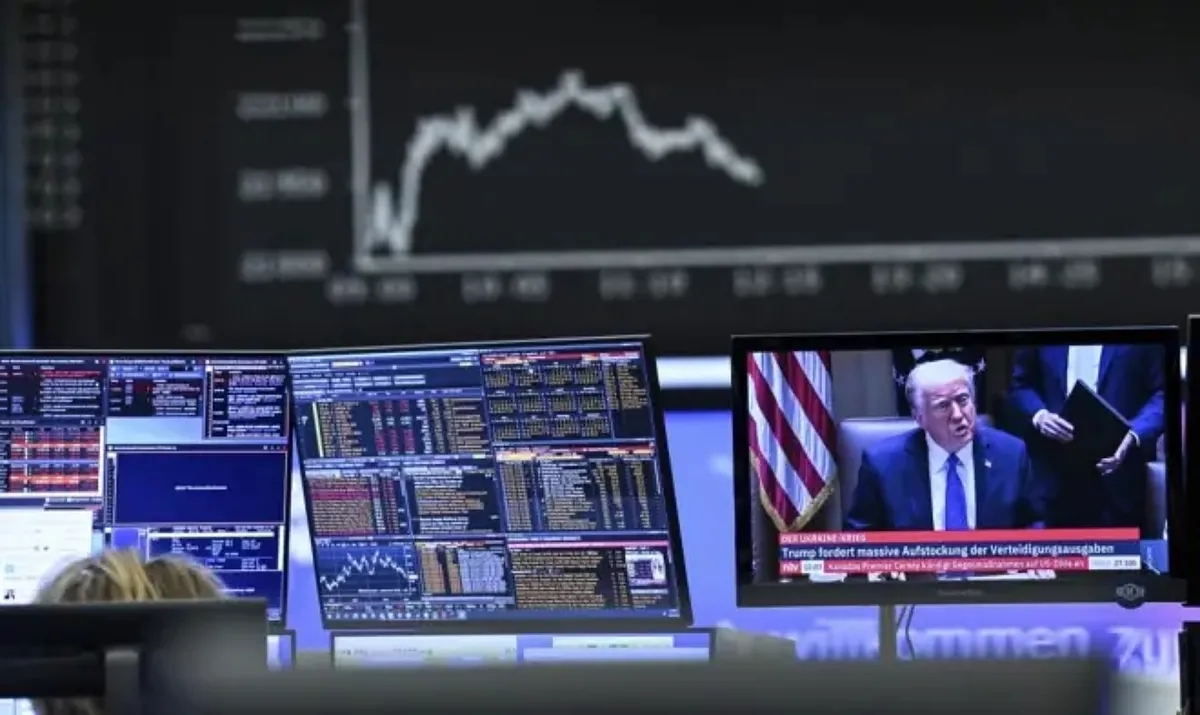

Sport, one of the world’s great industries and, like practically all of them, is closely linked to international trade and global economic flows, has been greatly affected by the tariffs on imports to the United States imposed in the last few hours by President Donald Trump. Manufacturers of clothing and equipment such as Adidas, Puma and Nike have suffered sharp declines in their stock market value. As is well known, these companies, the first two European and the third American, carry out much of their production in Asia, in countries that have been heavily penalized by the president’s protectionist policy. Nike carries out around 50% of its production in Asia and Adidas 40%.
In recent hours, the stock market value of Adidas on the Frankfurt Stock Exchange has fallen by10.3%, Puma by 10.6% and Nike by10% on the New York Stock Exchange. Imports from Cambodia have been taxed at 49%, Vietnam at 46%, Thailand at 36%, China at 34%, and Indonesia and Taiwan at 32%. Some of the production that was being done in China was even being moved to Vietnam.
Video from a cruise ship shows massive 40 foot waves smashing into the ship
The impression in economic circles is that Trump’s protectionist policy has two objectives: one, to get money so that the state can offer a tax cut. Another is to get the United States to attract industrial production. However, the most immediate foreseeable consequence is high inflation in the United States, since there is no possibility of relocating production chains except in the very long term due to the complexity of production and logistics chains. This is in case companies decide to accept this option.
These consequences are not the only implications for the sports industry as it is one of the most globalised and one in which many elements of ‘primary’ production converge, from food to technology. It remains to be seen what the long-term impact will be.
This news was originally published on this post .
Tagged as:
Adidas - English Donald Trump - English Nike - English
About the author
WATCH: Louisville LB T.J. Capers hauls in play-of-the-year candidate INT to clinch upset win over No. 2 Miami
ESPN Louisville pulled off one of the biggest upsets of the 2025 college football season Friday, knocking off No. 2 Miami 24-21 to shake up both the ACC title and College Football Playoff races. The win wouldn't have been possible without the late heroics of linebacker T.J. Capers, who made an incredible defensive play in the final minute.With Miami facing third-and-1 from the Louisville 31-yard line and 36 seconds remaining, quarterback Carson Beck tried to throw a quick pass near the sideline to move the chains. The ball was deflected at the line of scrimmage, and Capers somehow came down with the interception to seal the game.The pick gave Louisville its first-ever road win over an AP top-five opponent. Miami (5-1, 1-1 ACC) entered as the favorite to win the ACC crown, but the loss complicates its path to the […]
SPORTIVO October 18, 2025
Predators, ending up-and-down trip, taking aim at streaking Jets
Oct 16, 2025; Montreal, Quebec, CAN; Nashville Predators left wing Filip Forsberg (9) shoots the puck against the Montreal Canadiens during the third period at Bell Centre. Mandatory Credit: David Kirouac-Imagn Images The Nashville Predators, coming off a game they felt they let get away, wrap up a four-game road trip Saturday night when they face the Central Division rival Winnipeg Jets. Nashville led 2-1 at Montreal on Thursday before the Canadiens' Cole Caufield tied it with 20 seconds remaining in regulation. Caufield added the winner with three seconds left in the extra session, leaving the Predators with a 3-2 loss and a 1-1-1 mark on their road trip. "We've got to go out and win a game (in Winnipeg) and make it a half-decent trip," said Steven Stamkos, who scored his first goal of the season in the overtime […]
SPORTIVO October 18, 2025
Carson Beck’s 4 interceptions doom No. 2 Miami against Louisville
Oct 17, 2025; Miami Gardens, Florida, USA; Louisville Cardinals wide receiver Chris Bell (0) carries the football against Miami Hurricanes defensive back Jr. Romanas Frederique (29) during the second quarter at Hard Rock Stadium. Mandatory Credit: Sam Navarro-Imagn Images The Louisville Cardinals collected four interceptions off Miami quarterback Carson Beck to end the second-ranked Hurricanes' 10-game home winning streak and leave Miami Gardens, Fla., with a 24-21 victory on Friday night. The last team to defeat Miami at home? Louisville, in 2023. Chris Bell caught nine passes for 136 yards and two scores for the Cardinals (5-1, 2-1 Atlantic Coast Conference), who earned their second win ever over a top-two team in the Associated Press rankings. Running back Isaac Brown, who had battled injuries for the past month, ran 15 times for 113 yards. Beck, who entered Friday as one […]
SPORTIVO October 18, 2025
Eugenio Suarez, M’s slam Jays, close in on first World Series
Oct 17, 2025; Seattle, Washington, USA; Seattle Mariners third baseman Eugenio Suarez (28) tosses his bat after hitting a grand slam against the Toronto Blue Jays during the eighth inning during game five of the ALCS round for the 2025 MLB playoffs at T-Mobile Park. Mandatory Credit: Steven Bisig-Imagn Images SEATTLE -- In the hallway outside the Seattle Mariners' clubhouse is a sign that reads "Good Vibes Only," a phrase coined by Eugenio Suarez when he helped the franchise snap a 21-year postseason drought in 2022. After Suarez subsequently spent 1 1/2 years in Arizona, the Mariners reacquired the slugging third baseman at this summer at the trade deadline. That move more than paid off on Friday, when Suarez's second home run of the game, an eighth-inning grand slam, broke a tie as the Mariners defeated the Toronto Blue Jays […]
SPORTIVO October 18, 2025
Duke Roufus dies at 55: Famed head coach of multiple UFC champions, founder of Roufusport passes away
The mixed martial arts world has lost one of its premier minds. Duke Roufus, the legendary coach who led Anthony "Showtime" Pettis and Tyron Woodley to UFC championships, has died at 55 years old.Scott Joffe, one of the head coaches at Roufusport, which Roufus founded, announced the news on Friday through his verified Facebook account. Roufus passed away in his sleep on Thursday, according to Joffe."Today, the Roufusport family and martial arts world was stunned by the heartbreaking news that Duke Roufus, world-renowned top MMA coach, founder, and namesake of Roufusport MMA Academy, passed away peacefully in his sleep," Joffe wrote on Facebook. "Duke was more than a celebrated trainer and champion kickboxer -- he was a mentor, innovator, father and friend whose influence transformed the landscape of mixed martial arts. "His knowledge, charisma, and passion inspired countless fighters to reach heights […]
SPORTIVO October 18, 2025
Alex Ovechkin, Dylan Strome spark Caps over Wild
Oct 17, 2025; Washington, District of Columbia, USA; Washington Capitals left wing Alex Ovechkin (8) celebrates with teammates after scoring a goal against the Minnesota Wild during the third period at Capital One Arena. Mandatory Credit: Geoff Burke-Imagn Images Dylan Strome had two goals with two assists, while Alex Ovechkin scored career goal No. 898 and added an assist as the Washington Capitals won their fourth straight, 5-1 over the visiting Minnesota Wild on Friday night. Ovechkin, who assisted on Strome's first-period goal, notched his first of the season 1:19 into the third to put the Capitals ahead 3-1. Strome added an insurance tally with 8:28 remaining in regulation for Washington, which also got a goal apiece from Aliaksei Protas and Tom Wilson, and outshot the Wild 45-14. Directly off a Strome faceoff win, the puck slid to Ovechkin, who […]
SPORTIVO October 18, 2025
Related
WATCH: Louisville LB T.J. Capers hauls in play-of-the-year candidate INT to clinch upset win over No. 2 Miami
ESPN Louisville pulled off one of the biggest upsets of the 2025 college football season Friday, knocking off No. 2 Miami 24-21 to shake up both the ACC title and College Football Playoff races. The win wouldn't have been possible without the late heroics of linebacker T.J. Capers, who made an incredible defensive play in the final minute.With Miami facing third-and-1 from the Louisville 31-yard line and 36 seconds remaining, quarterback Carson Beck tried to throw a quick pass near the sideline to move the chains. The ball was deflected at the line of scrimmage, and Capers somehow came down with the interception to seal the game.The pick gave Louisville its first-ever road win over an AP top-five opponent. Miami (5-1, 1-1 ACC) entered as the favorite to win the ACC crown, but the loss complicates its path to the […]
SPORTIVO October 18, 2025
Predators, ending up-and-down trip, taking aim at streaking Jets
Oct 16, 2025; Montreal, Quebec, CAN; Nashville Predators left wing Filip Forsberg (9) shoots the puck against the Montreal Canadiens during the third period at Bell Centre. Mandatory Credit: David Kirouac-Imagn Images The Nashville Predators, coming off a game they felt they let get away, wrap up a four-game road trip Saturday night when they face the Central Division rival Winnipeg Jets. Nashville led 2-1 at Montreal on Thursday before the Canadiens' Cole Caufield tied it with 20 seconds remaining in regulation. Caufield added the winner with three seconds left in the extra session, leaving the Predators with a 3-2 loss and a 1-1-1 mark on their road trip. "We've got to go out and win a game (in Winnipeg) and make it a half-decent trip," said Steven Stamkos, who scored his first goal of the season in the overtime […]
SPORTIVO October 18, 2025
Carson Beck’s 4 interceptions doom No. 2 Miami against Louisville
Oct 17, 2025; Miami Gardens, Florida, USA; Louisville Cardinals wide receiver Chris Bell (0) carries the football against Miami Hurricanes defensive back Jr. Romanas Frederique (29) during the second quarter at Hard Rock Stadium. Mandatory Credit: Sam Navarro-Imagn Images The Louisville Cardinals collected four interceptions off Miami quarterback Carson Beck to end the second-ranked Hurricanes' 10-game home winning streak and leave Miami Gardens, Fla., with a 24-21 victory on Friday night. The last team to defeat Miami at home? Louisville, in 2023. Chris Bell caught nine passes for 136 yards and two scores for the Cardinals (5-1, 2-1 Atlantic Coast Conference), who earned their second win ever over a top-two team in the Associated Press rankings. Running back Isaac Brown, who had battled injuries for the past month, ran 15 times for 113 yards. Beck, who entered Friday as one […]
SPORTIVO October 18, 2025
Eugenio Suarez, M’s slam Jays, close in on first World Series
Oct 17, 2025; Seattle, Washington, USA; Seattle Mariners third baseman Eugenio Suarez (28) tosses his bat after hitting a grand slam against the Toronto Blue Jays during the eighth inning during game five of the ALCS round for the 2025 MLB playoffs at T-Mobile Park. Mandatory Credit: Steven Bisig-Imagn Images SEATTLE -- In the hallway outside the Seattle Mariners' clubhouse is a sign that reads "Good Vibes Only," a phrase coined by Eugenio Suarez when he helped the franchise snap a 21-year postseason drought in 2022. After Suarez subsequently spent 1 1/2 years in Arizona, the Mariners reacquired the slugging third baseman at this summer at the trade deadline. That move more than paid off on Friday, when Suarez's second home run of the game, an eighth-inning grand slam, broke a tie as the Mariners defeated the Toronto Blue Jays […]
SPORTIVO October 18, 2025
Duke Roufus dies at 55: Famed head coach of multiple UFC champions, founder of Roufusport passes away
The mixed martial arts world has lost one of its premier minds. Duke Roufus, the legendary coach who led Anthony "Showtime" Pettis and Tyron Woodley to UFC championships, has died at 55 years old.Scott Joffe, one of the head coaches at Roufusport, which Roufus founded, announced the news on Friday through his verified Facebook account. Roufus passed away in his sleep on Thursday, according to Joffe."Today, the Roufusport family and martial arts world was stunned by the heartbreaking news that Duke Roufus, world-renowned top MMA coach, founder, and namesake of Roufusport MMA Academy, passed away peacefully in his sleep," Joffe wrote on Facebook. "Duke was more than a celebrated trainer and champion kickboxer -- he was a mentor, innovator, father and friend whose influence transformed the landscape of mixed martial arts. "His knowledge, charisma, and passion inspired countless fighters to reach heights […]
SPORTIVO October 18, 2025
Alex Ovechkin, Dylan Strome spark Caps over Wild
Oct 17, 2025; Washington, District of Columbia, USA; Washington Capitals left wing Alex Ovechkin (8) celebrates with teammates after scoring a goal against the Minnesota Wild during the third period at Capital One Arena. Mandatory Credit: Geoff Burke-Imagn Images Dylan Strome had two goals with two assists, while Alex Ovechkin scored career goal No. 898 and added an assist as the Washington Capitals won their fourth straight, 5-1 over the visiting Minnesota Wild on Friday night. Ovechkin, who assisted on Strome's first-period goal, notched his first of the season 1:19 into the third to put the Capitals ahead 3-1. Strome added an insurance tally with 8:28 remaining in regulation for Washington, which also got a goal apiece from Aliaksei Protas and Tom Wilson, and outshot the Wild 45-14. Directly off a Strome faceoff win, the puck slid to Ovechkin, who […]
SPORTIVO October 18, 2025







Be the first to leave a comment